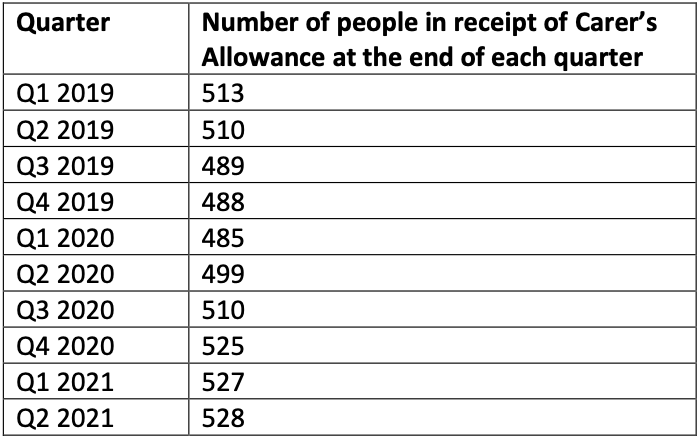


Financial support on offer for informal carers is not good enough, says a deputy, who says their contribution to the local community and economy is undervalued.
Guernsey Party Deputy Liam McKenna submitted Rule 14 questions to the Employment & Social Security Committee about the carer's allowance, which makes up £2.3m of the £6.75m spent in 2020 on that and the severe disability benefit.
At the time of the publication of the Supported Living and Ageing Well Strategy in 2016, it was estimated that the number of informal unpaid carers in the Bailiwick was in the region of 4,000-6,000.
However, only 500 or so actually claim Carer's Allowance.

Pictured: Number of people in receipt of Carer’s Allowance as at the end of each calendar quarter in 2019, 2020 and at the end of the first and second quarters of 2021.
Deputy McKenna asked ESS President Peter Roffey whether he agreed that an allowance of £89.83 per week "demonstrates a very low level of appreciation and value shown by the States of Guernsey for the very significant and valuable contribution made by informal unpaid carers".
Deputy Roffey was also asked for an update on recommendations stemming from the Carers Action Plan, published in 2019.
"The Carers Action Plan aimed to identify actions for change which could be delivered during the previous term of government to improve support (in the widest sense – not just financial support) for people who have a significant unpaid role caring for family members or friends."
Of the three recommendations under his committee's mandate, changes to sickness allowance for carers were implemented in April 2020.

Pictured: ESS President Peter Roffey replied to Deputy McKenna's questions.
However, a suggestion to make carers "less burdened with the administration of benefit claims" is still ongoing. It was meant to be delivered by the end of 2019.
Meanwhile, an action to make employers justify decisions to refuse staff flexible working arrangements remains completely unmet and will not happen this term.
On the financial support, Deputy Roffey said his Committee is keen to review the Carer's Allowance in the round.
"I very much appreciate the significant and valuable contribution that informal carers make to society. The Committee is also in agreement that the care provided by informal carers should be recognised and remunerated sufficiently to enable care to be provided.
"Further, the Committee is keen to review the Carer’s Allowance properly in order to determine whether the current rate and structure of the Allowance remains appropriate in today’s context.
"However, I do not think it’s helpful or appropriate to draw any conclusions about how much the States of Guernsey values carers based solely on the rate of Carer’s Allowance. In considering this question, it is important to understand that Carer’s Allowance is not the only financial support available to carers."

Pictured: Weekly rates of Carer’s Allowance, which was first introduced as the Invalid Care Allowance in 1986.
"Additional financial support is available for carers on low incomes through the means-tested benefit, Income Support. Income Support is assessed on the basis of an individual’s personal circumstances.
"Carer’s Allowance is treated in the same way as earnings in the Income Support means test, i.e. the first £35 of the allowance is disregarded. Severe Disability Benefit is fully disregarded, meaning that a recipient will retain the full value of their Severe Disability Benefit on top of their Income Support requirement rate.
"Therefore, a household that includes a person in receipt of Severe Disability Benefit and their carer, who qualifies for Carer’s Allowance, would retain £146.02 per week (2021 rates) of the value of these benefits in addition to their requirement rate, including an allowance for rent."
Comments
Comments on this story express the views of the commentator only, not Bailiwick Publishing. We are unable to guarantee the accuracy of any of those comments.